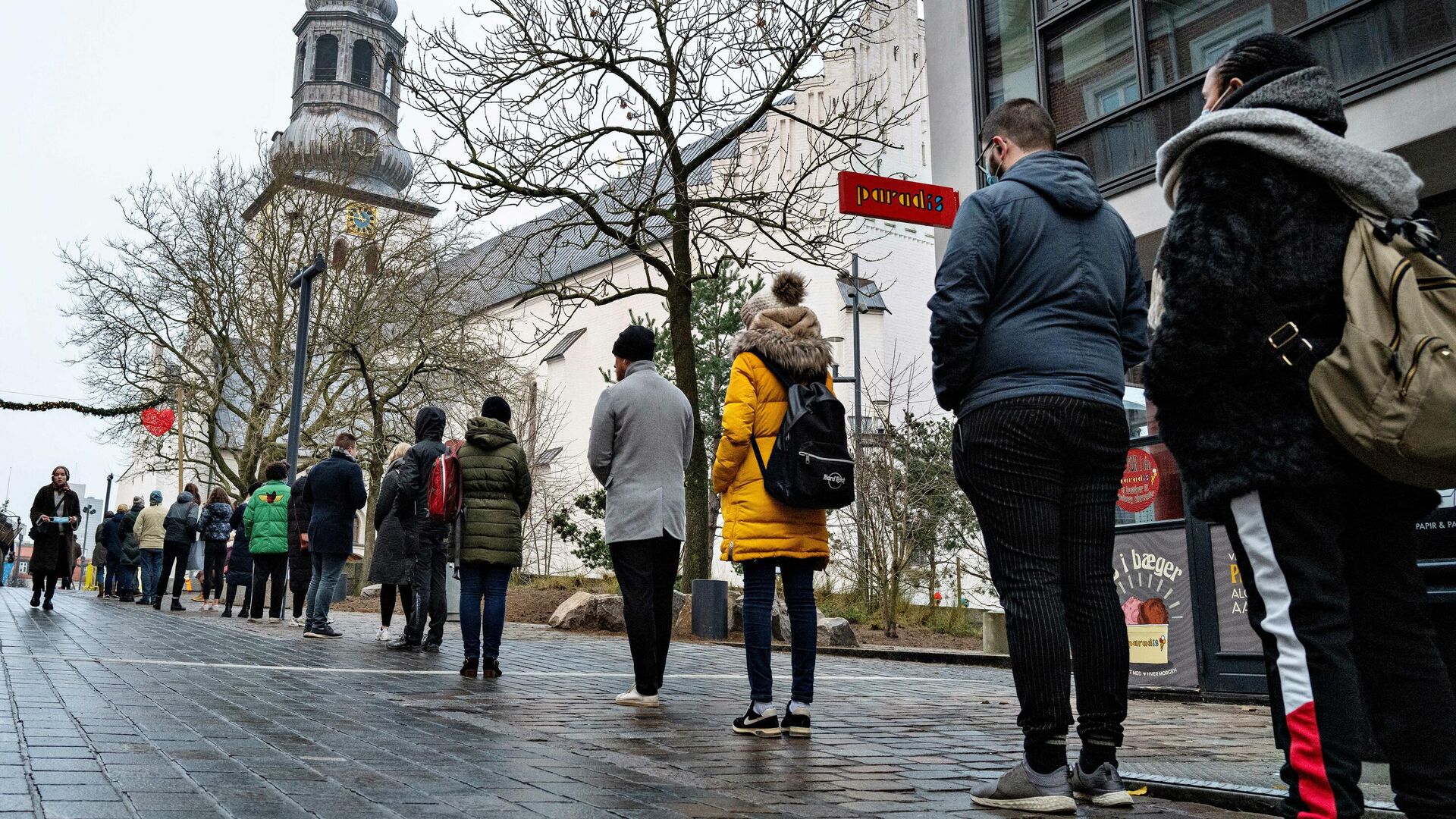https://sputnikglobe.com/20220321/denmark-claims-to-have-reached-herd-immunity-against-covid-19-but-for-how-long-1094042848.html
Denmark Claims to Have Reached Herd Immunity Against COVID-19, But for How Long?
Denmark Claims to Have Reached Herd Immunity Against COVID-19, But for How Long?
Sputnik International
The concept of herd or flock immunity denotes a state in which a disease can no longer spread widely in society. Yet, in the case of the coronavirus, it may... 21.03.2022, Sputnik International
2022-03-21T06:33+0000
2022-03-21T06:33+0000
2022-03-21T06:33+0000
omicron covid strain
denmark
scandinavia
newsfeed
covid-19
immunity
https://cdn1.img.sputnikglobe.com/img/07e6/01/04/1092016525_0:196:2945:1853_1920x0_80_0_0_d948e1caefe58f50a58ba0d2b6f29415.jpg
The concept of herd immunity has become widely known during the corona pandemic as a hopeful future scenario, and Denmark has reached exactly that stage, Tyra Grove Krause, the director of the State Serum Institute (SSI), has proclaimed.Restrictions have been gone for several months now, and infection rates are going downwards. At present, infection rates continue to fluctuate between 8,000 and 11,000 cases a day, down from over 50,000 cases during the winter peak. "The infection does not run so fast anymore, because there is a long distance between susceptible people", Tyra Grove Krause told TV2.The SSI's assessment about the state of herd immunity in Denmark has been supported by both Viggo Andreasen, an associate professor of mathematical epidemiology at Roskilde University, and Lone Simonsen, a professor and head of the PandemiX Centre at the same university. Andreasen emphasised a trend in which congested areas that used to have high infection rates, such as Copenhagen and other metropolitan areas, are now seeing a pronounced slump in new cases. Yet, there are several factors that may challenge immunity. Unlike diseases such as smallpox and measles, immunity to coronavirus isn't lifelong.According to Tyra Grove Krause and the SSI's prognosis, it is expected to last for "at least half a year and probably longer".Furthermore, unlike stable diseases, the coronavirus is mutating, which may lead to the emergence of new variants with a higher morbidity rate. Per Grove Krause, if this were to happen, it would be like "starting over" with resistance to the virus. Nevertheless, she assured that the basic immunity from vaccines and previous infections may protect against serious disease in the future.Immunity is strongest among the younger part of the population, while the elderly and vulnerable are still at a higher risk of becoming infected.Over the course of the pandemic, Denmark, a nation of 5.8 million, has seen some three million COVID-19 cases, with some 5,300 fatalities. In February, the nation became the first in the EU to lift most restrictions on public life, despite a surge in cases amid the Omicron strain.Let's stay in touch no matter what! Follow our Telegram channel to get all the latest news: https://t.me/sputniknewsus
denmark
scandinavia
Sputnik International
feedback@sputniknews.com
+74956456601
MIA „Rosiya Segodnya“
2022
News
en_EN
Sputnik International
feedback@sputniknews.com
+74956456601
MIA „Rosiya Segodnya“
Sputnik International
feedback@sputniknews.com
+74956456601
MIA „Rosiya Segodnya“
denmark, scandinavia, newsfeed, covid-19, immunity
denmark, scandinavia, newsfeed, covid-19, immunity
Denmark Claims to Have Reached Herd Immunity Against COVID-19, But for How Long?
The concept of herd or flock immunity denotes a state in which a disease can no longer spread widely in society. Yet, in the case of the coronavirus, it may ultimately wear off if challenged by emerging novel strains.
The concept of herd immunity has become widely known during the corona pandemic as a hopeful future scenario, and Denmark has reached exactly that stage, Tyra Grove Krause, the director of the State Serum Institute (SSI), has proclaimed.
Restrictions have been gone for several months now, and infection rates are going downwards. At present, infection rates continue to fluctuate between 8,000 and 11,000 cases a day, down from over 50,000 cases during the winter peak.
"The infection does not run so fast anymore, because there is a long distance between susceptible people", Tyra Grove Krause told TV2.
The SSI's assessment about the state of herd immunity in Denmark has been supported by both Viggo Andreasen, an associate professor of mathematical epidemiology at Roskilde University, and Lone Simonsen, a professor and head of the PandemiX Centre at the same university. Andreasen emphasised a trend in which congested areas that used to have high infection rates, such as Copenhagen and other metropolitan areas, are now seeing a pronounced slump in new cases.
“The epidemic is ebbing away in Denmark, and not due to restrictions that hold it back. This is due to herd immunity", Lone Simonsen ventured.
Yet, there are several factors that may challenge immunity. Unlike diseases such as smallpox and measles, immunity to coronavirus isn't lifelong.
"This immunity is not permanent, just as with the flu. But I think we are doing really well with our mix of natural infection and immunity through the vaccine", Lone Simonsen said.
According to Tyra Grove Krause and the SSI's prognosis, it is expected to last for "at least half a year and probably longer".
Furthermore, unlike stable diseases, the coronavirus is mutating, which may lead to the emergence of new variants with a higher morbidity rate. Per Grove Krause, if this were to happen, it would be like "starting over" with resistance to the virus. Nevertheless, she assured that the basic immunity from vaccines and previous infections may protect against serious disease in the future.
Immunity is strongest among the younger part of the population, while the elderly and vulnerable are still at a higher risk of becoming infected.
Over the course of the pandemic, Denmark, a nation of 5.8 million, has seen some three million COVID-19 cases, with some 5,300 fatalities. In February, the nation became the first in the EU to lift most
restrictions on public life, despite a surge in cases amid the Omicron strain.
Let's stay in touch no matter what! Follow our Telegram channel to get all the latest news: https://t.me/sputniknewsus 



